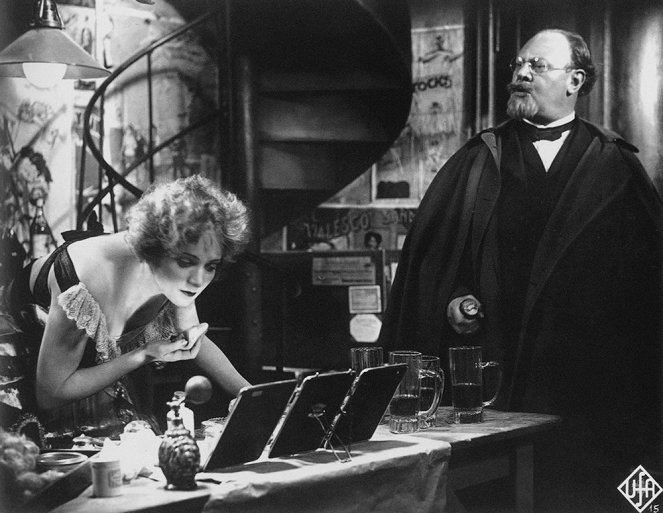Directed by:
Josef von SternbergCinematography:
Günther RittauComposer:
Friedrich HollaenderCast:
Emil Jannings, Marlene Dietrich, Kurt Gerron, Rosa Valetti, Hans Albers, Reinhold Bernt, Eduard von Winterstein, Roland Varno, Carl Balhaus, Gerhard Bienert (more)Plots(1)
The Blue Angel is one of the first German language sound films (filmed simultaneously in an English-language version), and the picture that represents the initial collaboration between Josef von Sternberg and his immortal muse, Marlene Dietrich. Following up his role in Sternberg's great silent The Last Command, Emil Jannings portrays a schoolteacher named Immanuel Rath, whose fateful expedition to catch his students frequenting the cabaret known as "The Blue Angel" leads to his own rapture with the establishment's main attraction Lola (Dietrich) - and, as a result, triggers the downward spiral of his life and fortune. Directed by Sternberg while on loan from America to the pioneering German producer Erich Pommer, The Blue Angel is at once captivating, devastating, and powerfully erotic, laced-through with Sternberg's masterful cinematography. From here, the director and Dietrich would go on to make six more films together in the span of five years, and leave a legacy of some of the most indelible iconography in the cinema of glamour and obsession. (Eureka Entertainment)
(more)Reviews (2)
Josef von Sternberg's The Blue Angel was meant to enhance the star status of Emil Jannings, who had returned from Hollywood. This living great from films such as Madame DuBarry, Anna Boleyn, The Tragedy of Love, The Last Laugh, Waxworks, Tartuffe, Faust, and The Last Command was not entirely comfortable in English-language cinema and was, therefore, meant to burst onto German cinema screens with his thunderous voice as Professor Unrat. Marlene Dietrich charmed Von Sternberg in the play "Two Ties," among other things because she acted in both German and English, and Blue Angel was intended to be a double production from the beginning. She was supposed to be a decoy in Jannings' solo creation, and her salary was low compared to his, but nothing seemed to stop the energy-filled star next to whom Jannings became a regular actor in the course of one evening. How is it possible that in such a tight battle, there was still room for the other well-acted roles by Kurt Gerron, Hans Albers, and Rosa Valetti? Such was the environment of the Blue Angel Inn, which, at the crossroads of literary adaptation, Kammerspielfilm, expressionism, and part talkies, dominated the masses only to be rejected during the following years of rampant Nazism and rediscovered after its defeat. Marlene built her American myth on the legacy of her first collaboration with Joe, which only today is fully respected in the full breadth of the collaboration between the two geniuses. We should thus perceive this film in the context of Weimar and Hollywood, as it will richly reward us for doing so.
()
This movie is good, there is no doubt about it. I even like the self-destruction aspect, which is what it's all about. However, unfortunately, that doesn't change the fact that the movie didn't captivate me. There are great metaphors, interesting connections, but the whole time I felt disconnected from the film and couldn't get under its skin. Or maybe it didn't even want me to.
()

